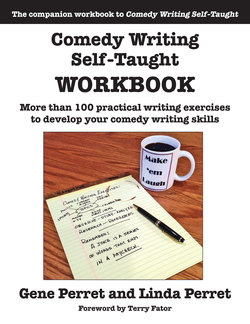Читать книгу Comedy Writing Self-Taught Workbook - Gene Perret - Страница 7
На сайте Литреса книга снята с продажи.
ОглавлениеIntroduction
Writers write. That’s what we do. As comedy writers, we generate funny material and receive a paycheck in return. It’s a great system. And it’s what makes us professionals. But like the skills of any pro, those needed to earn that paycheck have to be honed, sharpened, and perfected. Even then, once you develop those skills, you must keep them in shape. All that comes about by writing.
That’s the purpose of this book—to present exercises that you can use to keep your comedy muscles toned and, who knows, maybe even develop a few that you didn’t know you had.
Good comedy should appear spontaneous and natural—but don’t be deceived. Comedy writing is hard work. It would be terrific if you could spend an afternoon reading this book and then magically become a great professional writer. It just doesn’t happen that way, darn it. You have to devote time and effort to it. You have to work at it.
The exercises in this book are challenging. They’re designed to be. As they say in the world of physical exercise, “No pain; no gain.” We want you to huff and puff a little bit. We want to get you out of your comfort zone. Because “out of your comfort zone” is where you develop new skills. And the more you work at these unfamiliar techniques, the easier they become to you.
Comedy writing is fun, but it has its headaches at times. As a professional writer, you will be asked to supply material quickly, on topics you may not be familiar with and sometimes under less than desirable circumstances. Now is the time to prepare for that sort of pressure. After completing the exercises in this book, you’ll be ready to face these situations. You’ve already conquered the tough challenges here, so you know you can do it.
A pro golfer doesn’t just walk out to the tee and hit the ball a ton. Oh sure, it may look that way on TV. But that golfer has practiced. He’s spent years going to the driving range, studying the courses, and playing the practice rounds. Now when he steps up to tee off, he knows he can hit the ball, because he has already done it thousands of times before.
Another purpose of these workouts is to expose you to different kinds of writing. You may want to write sitcoms and that’s great. But working on one-liners can help sharpen your joke writing skills that can be used in dialogue.
Sticking with our sports analogy, let’s look at boxers. What are they known for? Getting into a ring and pummeling their opponent. That’s what they do and then they collect their paycheck. But when they train, they don’t just box, they also work out on the bag to build up hand speed. They jump rope to improve their footwork. They run to build up stamina. In other words, they train to improve the overall package. So when they step into the ring, it’s easier for them to pummel the opponent, collect the check, and go home.
That’s what these exercises are designed to do for you—make you a well-rounded comedy writer who can take on any opponent.
We’ll admit that many of the exercises in this volume are not typical assignments that would be handed to you in the comedy writing profession. Yet they serve a purpose. These drills prepare you for the rigors of the writing life. The boxer doesn’t skip rope during the fight, but he’s often glad he did it before the bout. He’s glad it was part of his training. These exercises are part of your training. Even though some may not seem relevant to the normal comedy writing workday, if you can commit to them and give them the dedication they deserve, they’ll serve you well throughout your career.
The main purpose of this book, though, is to get you to write. Author, Hugh Prather once said, “If the desire to write is not accompanied by actual writing, then the desire is not to write.” We want you to write . . . and write . . . and write.
